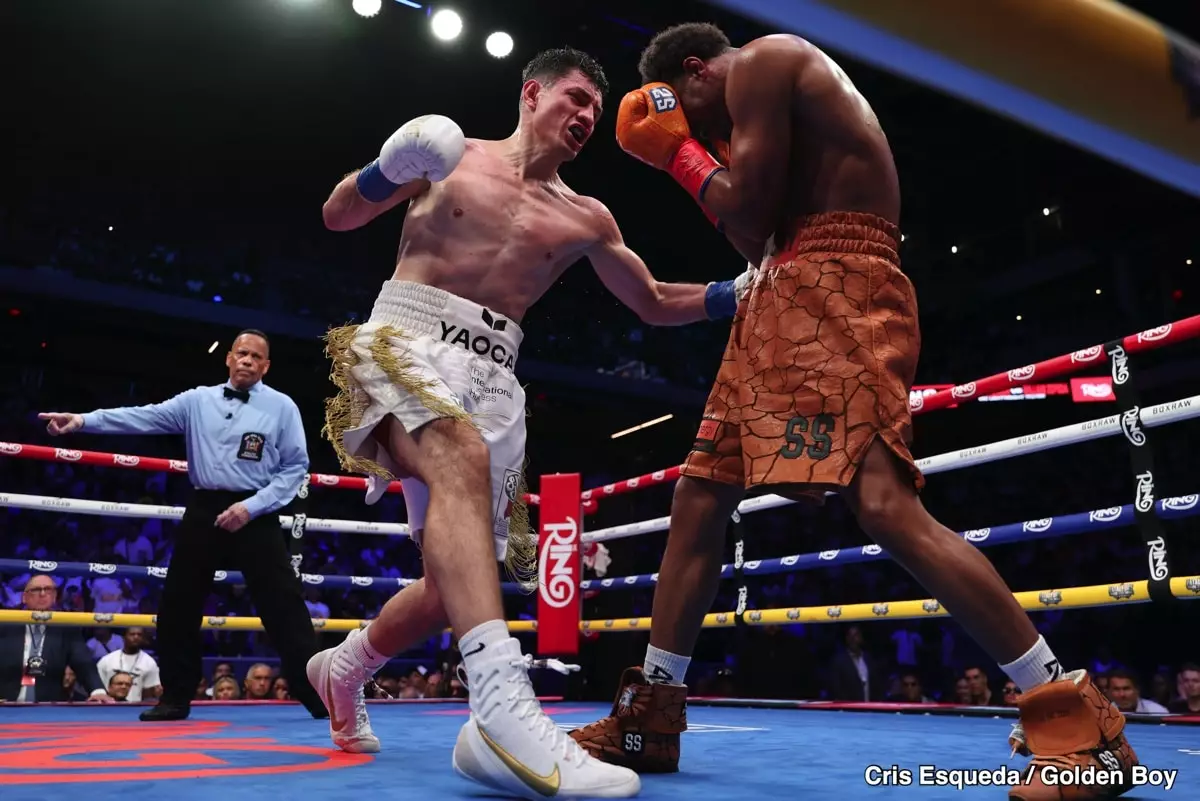The boxing landscape was shaken to its core during an electrifying night at Louis Armstrong Stadium, where a series of dramatic fights showcased both stunning knockout violence and controversial decisions. Foremost among these was Hamzah Sheeraz’s masterful dismantling of Edgar Berlanga, signaling a significant shift in the super middleweight division. Sheeraz’s victory was not just a win; it was a statement that sparked pundits and fans alike to reconsider the traditional hierarchy of the weight class.
Berlanga, once revered for his ferocious power and undefeated streaks, was caught off guard early in the bout, but what truly defined the outcome was Sheeraz’s relentless offensive surge. The fight turned when Sheeraz unleashed a blistering four-punch combination that struck Berlanga with precision, sending him face-first to the canvas in the fourth round. Although Berlanga managed to beat the count, his legs betrayed him, and he looked vulnerable—an aspect that Sheeraz exploited ruthlessly. The unstoppable barrage continued, culminating in a decisive fifth-round knockout, which prompted many to reevaluate Berlanga’s standing in the division.
This dominant performance showcased Sheeraz’s grit and skill, fortifying his position as a true title contender. His ambition extends beyond this victory; he’s openly eyeing megafights against giants like Canelo Alvarez, positioning himself as a boxer unafraid to stand toe-to-toe with the sport’s elite. His confidence is arguably well-founded, especially after dispatching a high-profile opponent with relative ease. For boxing purists, this moment underscores the importance of resilience and adaptive strategy—traits Sheeraz demonstrated with surgical precision.
Judicial Controversies & Unearned Favoritism Spark Debate
The night was not without its controversies, especially concerning the judges’ scoring decisions. The co-main event saw Shakur Stevenson, the reigning WBC lightweight champion, narrowly defeating challenger William Zepeda via unanimous decision. Yet, many viewers, including myself, felt the decision was profoundly biased. Despite Zepeda’s aggressive and effective work rate—landing cleaner shots and pressing the action—judges awarded Stevenson a landslide victory. Scores of 118-110 twice and 119-109 seem unjust, particularly considering the clear evidence that Zepeda outperformed his opponent in several rounds.
This discrepancy raises uncomfortable questions about the integrity of judging in boxing. It’s a pattern that persists—favoring the house fighter, even when the visual evidence suggests otherwise. Such decisions serve to undermine fans’ trust and the sport’s credibility. When the officials’ biases distort the true narrative of the fight, it diminishes the achievement of the rightful victor and damages the sport’s reputation as a fair contest.
Similarly, the Subriel Matias’s victory over Alberto Puello exemplified this problem. Despite being a hard-fought bout, some fans felt that the judges’ scoring was skewed, especially considering the excessive holding and grappling by Puello, which many believed should have been penalized more severely. The mediocre scoring allowed Matias’s pressure to shine through, but the controversy surrounding the judging added a dark cloud over what was otherwise an entertaining contest.
The Rise of Unpredictability and New Blood in Boxing’s Upper Echelons
Beyond the debate, the night offered a glimpse into the evolving nature of boxing, where emerging fighters are challenging established champions and rewriting expectations. The victory of Subriel Matias, for example, was a testament to the power of relentless pressure and raw determination. His victory sets the stage for an exhilarating showdown with Dalton Smith scheduled in Riyadh, promising fans an electrifying clash between two formidable talents.
Similarly, David Morrell’s comeback against Imam Khataev demonstrated resilience and tenacity. After a knockdown in the fifth round, Morrell’s fortitude propelled him to victory, finishing strong in the later rounds. Such performances highlight that no matter how precarious the situation seems, fighters with heart and adaptability can turn the tides.
Meanwhile, Reito Tsutsumi’s quick and surgical dismantling of Michael Ruiz with a second-round TKO signals the arrival of promising prospects who aren’t afraid to showcase their skills early. These emerging fighters inject new life into the sport and suggest that the future holds a multitude of exciting stories, provided the landscape remains fair and unsullied by questionable scoring.
In essence, this high-stakes night at Queens exemplified boxing’s unpredictable nature — moments of brilliance, controversy, and raw determination. Each fighter’s performance didn’t just tell a story of victory or defeat; it revealed the shifting power dynamics, the importance of integrity within the sport, and the relentless pursuit of greatness. As fans, we are reminded that boxing remains a spectacle of grit, willpower, and unpredictability—the qualities that keep us captivated and eager for what’s next.

